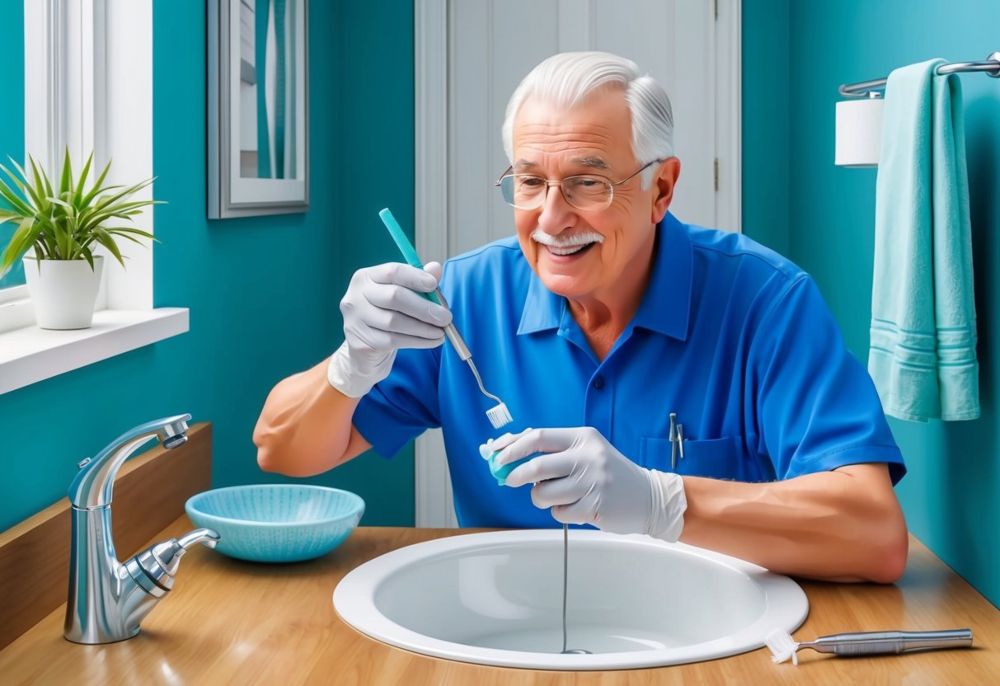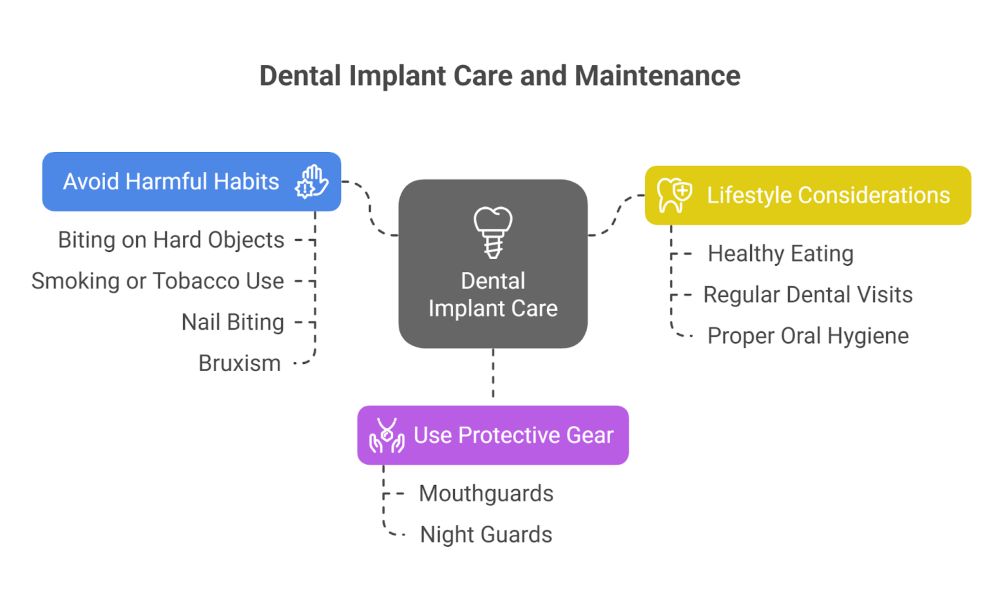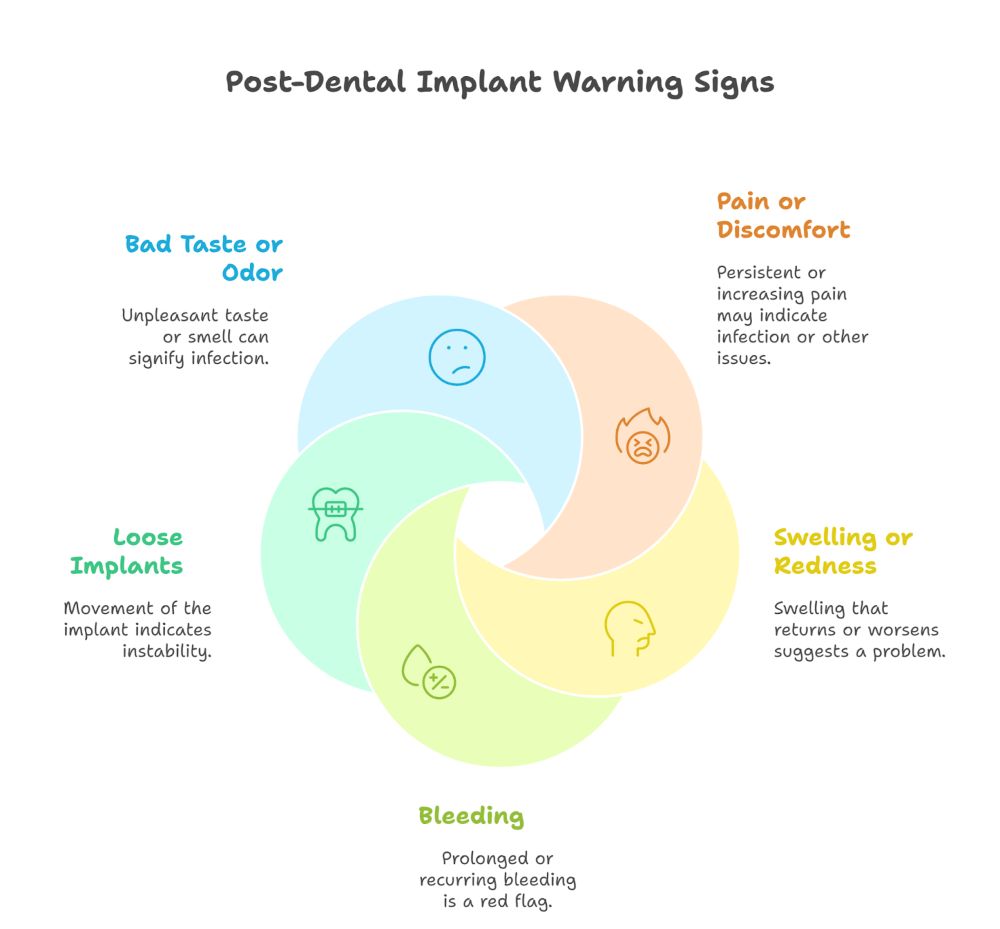
Caring for Your Dental Implants: A Guide for Seniors in West Palm Beach to Lifelong Oral Health
Originally published: April 2025 | Updated: June 2025 | Reviewed by Dr. Michael Berglass, DDS

Getting dental implants is a significant step toward enhancing your smile and boosting your confidence. For seniors in West Palm Beach, taking care of your implants really matters if you want them to last.
With proper care, your dental implants can remain healthy and strong for many years.
Keeping your implants in great shape is easier than it sounds. Simple daily habits, such as gentle brushing and regular check-ups, make a real difference.
Making a few lifestyle changes and catching issues early helps protect your dental investment.

Taking care of your dental implants daily helps them last longer and reduces your risk of infection or other complications. Using the right techniques and products protects both your implants and your natural teeth.
Brush your dental implants twice a day, in the morning and at night. Use a soft-bristle toothbrush; hard bristles can scratch your implants or irritate your gums.
Hold the brush at a 45-degree angle to your gum line and use gentle, circular motions. Clean all sides of each implant, especially the areas near your gums, where plaque tends to accumulate.
Electric toothbrushes work well because the vibrations help remove more plaque with less work. If it’s tough to grip a regular brush, try a larger-handled brush or an electric one.
Rinse your brush in warm water after each use and replace it every three months, or sooner if it appears worn. Regular brushing helps protect your implants from gum disease and other oral health issues.
Flossing around dental implants is different from flossing natural teeth. Use non-shredding floss specifically designed for implants to prevent leaving fibers behind.
Gently guide the floss between your teeth and implants. Wrap it in a C-shape around the base of each implant and move it up and down to clear away food and plaque.
If your hands aren’t as steady, try floss threaders or interdental brushes. These tools help clean those tricky spots between implants and gums.
Water flossers are another good option, especially if you have arthritis or limited hand movement—they use a gentle stream of water to clean between teeth. Floss at least once a day to keep the area around your implants clean and free from debris and bacteria.
Pick a soft-bristle toothbrush to be gentle on implants and gums. Electric toothbrushes make brushing easier and more thorough, especially for senior implant care in West Palm Beach.
Choose a non-abrasive toothpaste with little or no whitening agents to avoid scratching the surface. Non-shredding dental floss or implant-specific flosses prevent fibers from getting stuck under your gums.
Interdental brushes with soft bristles help clean between implants and other teeth. Use antimicrobial mouth rinses to reduce the risk of infection and maintain a fresh mouth.
Look for mouthwashes without alcohol; they won’t dry your mouth or irritate sensitive tissues.
If you’re ready to get started, call us now!
Maintaining the health of your dental implants requires regular visits to your dental team.
Appointments aren’t just for cleanings—they help prevent infections, catch implant problems, and keep your mouth in good shape as you get older.
Routine check-ups matter for maintaining dental implants. Your dentist looks for signs of gum disease, bone loss, or loose implants.
For seniors, these issues can arise unexpectedly and cause significant trouble if not detected early. Professional cleanings remove stubborn plaque and tartar that brushing at home misses.
Dentists use tools that won’t scratch your implants. Most people require cleanings twice a year, although some may need them more frequently if they are at a higher risk for gum problems.
Appointments also provide an opportunity to discuss any pain, swelling, or changes in your mouth. Let your dentist know about these symptoms right away—they can help prevent things from getting worse.
Your dentist checks the fit and placement of each implant during visits. Sometimes, they will take X-rays to examine the bone around your implants and ensure they are stable.
If they spot bone loss, they may suggest adjustments to brushing or special treatments. Gum health gets special attention—red or swollen gums can lead to implant failure.
If your dentist notices these signs, they may recommend an antibacterial rinse or adjust your cleaning routine. These steps help keep both your gums and implants healthy.
Regular check-ups are also a good opportunity to receive tips for daily home care, such as using a soft toothbrush, non-abrasive toothpaste, and implant-friendly floss.
Sticking to professional care and a consistent home routine helps ensure long-term implant maintenance and comfort.

Dental implants are strong, but they’re not indestructible. You can keep your implants safe by changing some daily habits and using special tools when needed.
Biting on hard things like ice, pens, or hard candies can crack or chip your dental implants. Chewing on non-food items puts too much force on the implant and can weaken it over time.
Smoking or using tobacco slows down healing and raises your risk for infection. This can harm both your implants and your gums.
Try to break habits like nail biting or using your teeth to open packages—those put extra stress on your implants. If you clench or grind your teeth at night (bruxism), talk to your dentist. That can wear down implants and even cause them to break.
If you participate in contact sports or enjoy activities like biking, consider wearing a mouthguard. A custom mouthguard from your West Palm Beach dentist provides better protection for your teeth and implants than store-bought ones.
Night guards are helpful if you grind your teeth while sleeping. They keep your upper and lower teeth from grinding against each other and damaging your implants.
Wearing the right protective gear is a simple way to avoid accidents. Ask your dentist about the best options for you—they’ll know what works.
Eating healthy foods is important for dental health. Try to avoid really sticky or hard foods that might pull or push against your implants.
Eating more fruits, vegetables, and lean proteins helps keep your gums and bones strong. Stay up-to-date with your dental visits in West Palm Beach.
Regular check-ups enable your dentist to identify small problems before they escalate into larger issues. Brush and floss every day, and use the right tools for implants, such as soft-bristled brushes or specialized floss.
If you have medical conditions like diabetes, it is essential to keep them under control, as they can impact healing and implant health, making a proactive difference in maintaining the strength of your dental implants.

Dental implants are often effective for many seniors, but issues can still arise. Knowing the signs and acting quickly helps protect your health and investment.
Keep an eye out for these warning signs after getting dental implants:
Good implant hygiene is crucial for seniors. Regular brushing, flossing, and gentle cleaning around the implant help lower your risk.
Attending regular dental checkups allows your dentist to identify potential problems early.
If you notice any of the warning signs above, here’s what you should do right away:
Don’t try to fix implant problems on your own. Quick action can save your implant and help you avoid bigger issues.
If you’re ready to get started, call us now!
Your daily habits play a significant role in determining the longevity of your dental implants.
Eating nutritious foods, drinking enough water, and taking care of your overall health all contribute to maintaining a strong smile in the long run.
After getting dental implants, you’ll want to choose gentle foods and provide your body with what it needs. Soft foods, such as scrambled eggs, yogurt, applesauce, and cooked vegetables, are easier to manage while you’re healing.
Skip hard, sticky, or crunchy foods—such as nuts, popcorn, and caramel. Those can put way too much pressure on your new implants and your gums.
Try to incorporate a variety of protein, vitamins, and minerals into your meals. Fish, chicken, tofu, and beans bring the protein your tissues need to heal.
Calcium from milk or leafy greens helps keep teeth and bones strong and healthy. That’s especially true for older adults.
Vitamin C from fruits like oranges or peppers? It’s great for your gums and can speed up recovery.
Here’s a quick meal plan idea:
If you’re curious about more post-implant food tips, check out local dental guidance.
Drinking enough water is crucial for your mouth, especially as you age. Water helps wash away food and bacteria that could bother your gums.
Drink at least 6-8 glasses of water a day. It might sound like a lot, but your mouth will thank you.
Try to avoid sugary drinks and sodas, as they can increase the likelihood of gum and tooth problems. Water is always the safest bet, as it helps combat dry mouth, a common issue among older adults.
If your medication causes dry mouth, keep a water bottle handy and take small sips. Sugar-free lozenges or mouth rinses can also help keep things comfortable.
Your overall health plays a crucial role in the healing and functioning of your dental implants.
If you have conditions like diabetes or heart disease, work with your doctor to keep them under control. Good blood sugar management, for instance, helps your mouth heal better.
Regular exercise gets your blood moving, which is good for your gums and bone tissue. And, of course, solid oral hygiene—brushing twice a day with a soft brush, flossing, and making regular dental appointments—makes a significant difference for seniors with implants.
Don’t smoke. It slows down healing and can even cause implants to fail. Honestly, it’s just not worth the risk.
If you’re dealing with ongoing health issues, keep your dentist and doctor informed about your condition. They can provide you with advice tailored to your specific situation, rather than just generic tips.
Caring for your dental implants is crucial if you want them to last. Simple habits, such as brushing gently and flossing daily, help keep your mouth clean and healthy.
These habits also lower your risk of infection after implant surgery. Keep a regular schedule for dental checkups and cleanings.
Your dentist checks your implants and cleans the areas where plaque tends to accumulate. That way, they can identify any issues early, before they become complicated.
Pay attention to changes in your mouth, like pain, swelling, or if an implant feels loose. If you notice anything unusual, please call your dentist immediately.
Your dental implants are built to last—but only with the right care. Schedule a visit with West Palm Beach Family Dental today and maintain a healthy, secure, and strong smile for years to come.
How should seniors clean dental implants at home?
Seniors should brush their teeth twice daily with a soft-bristled toothbrush and non-abrasive toothpaste. They should gently floss using implant-safe floss and consider using water flossers or interdental brushes for thorough cleaning.
How often should seniors with implants see a dentist?
Seniors with dental implants should visit their dentist every 3 to 6 months for professional cleanings, exams, and X-rays to ensure implant stability and detect early signs of complications.
What foods should seniors avoid after getting dental implants?
Hard, sticky, or overly crunchy foods, such as nuts, ice, and chewy candies, should be avoided—especially during the healing process—to protect the implant and surrounding tissues.
Can dry mouth affect dental implants?
Yes. Dry mouth increases the risk of gum disease and peri-implantitis. Seniors should stay hydrated and consult their dentist about saliva substitutes or mouth rinses if dry mouth persists.
What are the signs of implant problems seniors should watch for?
Redness, swelling, pain, or a loose implant may signal complications, such as peri-implantitis. Prompt dental attention is crucial for protecting your implant and maintaining optimal oral health.
Are water flossers safe for seniors with implants?
Yes. Water flossers are highly recommended for seniors with implants, especially those with limited dexterity, as they clean gently around implants and help remove debris.
Do lifestyle habits affect dental implant health?
Absolutely. Smoking, excessive alcohol, poor diet, and lack of routine oral care can all compromise implant health. Seniors should adopt healthy habits to protect their investment in their health.